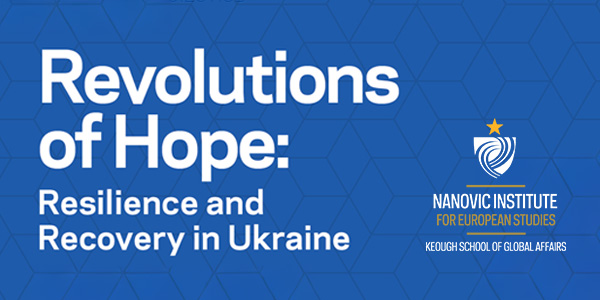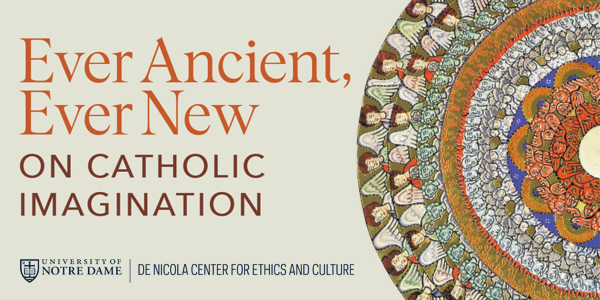The first virtual event in the Notre Dame Folk Choir’s The Way of the Cross series explored the early stages and development of the Folk Choir’s recent Passion performance. This event was moderated by J.J. Wright, Director of the Notre Dame Folk Choir. Wright spoke with three other collaborators on the Passion project: Kim Belcher, Professor in the Department of Theology at the University of Notre Dame; Anna Staud, senior and co-president of the Notre Dame Folk Choir and the Assistant Stage Director of The Passion; and Noelle Dorvault, first-year member of the Notre Dame Folk Choir. This discussion began with a formal walkthrough of the making of The Passion among Wright, Belcher, Staud, and Dorvault, followed by an opportunity for questions and answers from viewers.
Wright began the event by returning to the conception of the Folk Choir’s Passion, which began in a time dominated by news headlines covering the beginnings of COVID-19, the clergy sexual abuse crisis, and race demonstations after the murder of George Floyd. In creating The Passion, Wright and the Folk Choir hoped to build an environment where students could talk about the hard things, dubbed the “wicked problems,” during their most formative years while the world was dealing with so much suffering. With The Passion’s themes of betrayal, unwillingness to speak up, and limited support for the vulnerable, Wright found that it was “pretty easy to see the parallels” in the modern world. During difficult times, students should turn toward their peers and toward God to understand their suffering, rather than backing away from the challenges around them. The goal of The Passion is to create a space for reflection and encouragement to place oneself in the Passion, to understand it more fully, and to turn to one’s community for support.
Next, the speakers outlined the structure of the piece and why music was a natural choice in retelling the Passion story. Wright explained that by becoming “co-creators in something that [one is] trying to become more of,” one can learn the words fully and work toward a bigger, shared goal. In the Folk Choir’s case, that meant using their talents to turn their bodies into art, creating music and insights to better understand the Passion. The 90-minute performance tells the story of the days leading up to and including Jesus’ crucifixion and death. Narrated by an Evangelist figure called Memory, John the Evangelist and Mary Magdalene in the Upper Room on Holy Saturday, and supported by an Apostle’s chorus, full chorus, and a band, the performance unearths the importance of memory – how it shaped the Apostles’ identities then and how it shapes our identities as Christians today.
For the remainder of the event, the speakers unpacked the development of the Folk Choir’s The Passion. With COVID-19 temporarily suspending many of the joys of Mass, including singing and community, many members of the choir were left searching for a creative and spiritual outlet. This project allowed them to channel their frustration with global and spiritual suffering through music. Using the Gospels and other Scripture as guidance, a small group of musicians, theologians, and students reflected individually and collectively to examine how the Apostles felt following Christ’s crucifixion. The process started with free-writing on Scripture, moved into writing dialogues between characters in the form of a Libretto, and eventually became a scene with words spoken and sung as the Apostles tried to comprehend the events unfolding before them in the Passion. After the work was fairly complete, even more members of the Folk Choir were able to collaborate together and remain in touch with music, their faith, and each other — even during socially distanced times.
To conclude the event, the speakers pointed toward future episodes in the series, notably the next event during which several members of the Folk Choir would discuss the wicked problems currently plaguing the world and how understanding the Passion can guide Christians in handling their struggles, taking responsibility, and moving forward as better people.
Visit the event page for more.







